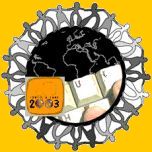| |||||
BerichteAFRICA AND ASIA: DIFFERENT CONTINENTS, SIMILAR PROBLEMS There is much that separates Africa and Asia, not least ethnicity, culture and language. But, as the third and final leg of this year’s World Social Forum (WSF) gathers momentum in the Pakistani financial centre of Karachi, the hope is that civic groups will build on common aspirations for the two continents.
(from Moyiga Nduru, IPS/TerraViva) Johannesburg - "I have confidence that the participants at the Karachi forum will refer to Africa a lot in their deliberations. They will set a firm foundation for our next meeting in Nairobi in January 2007," Thomas Deve of the Harare-based Mwelekeo wa NGO (MWENGO) told IPS in an interview from the Zimbabwean capital. ("Mwelekeo wa NGO" is a Kiswahili term meaning "direction" or "vision" of NGOs – non-governmental organisations. MWENGO seeks to strengthen NGOs working in the Southern and East Africa regions.) The gathering in the Kenyan capital of Nairobi will mark the second instance in which a WSF is being held in Africa; a forum that took place earlier this year (Jan. 19 to 23) in Bamako, capital of Mali, was the first. Now in its sixth year, the WSF has most often been held in the Brazilian town of Porto Alegre. However, the 2006 forum – described by organisers as "polycentric" – is taking place across three venues: Bamako, the Venezuelan capital of Caracas (Jan. 24 to 29), and now Karachi (Mar. 24 to 29). The Karachi WSF was initially scheduled to be held at the same time as the Caracas gathering; however, it was postponed after an earthquake that took place in Pakistan on Oct. 8, 2005, killed about 90,000 people – and left 3.5 million homeless. According to Deve, there is no shortage of problems and debates where Africa and Asia can speak with one voice. "Asia and Africa have the same structural causes of poverty. These can possibly drive them to come up with similar solutions," he noted. "Within the WSF, we share the same big constituency of poor people who, when brought under the same roof, feel equal." Many across the two continents are distrustful of business, and fear domination by wealthy countries, Deve added. "Their views towards multinational corporations are exactly the same. Their views on GM (genetically modified food) and agriculture coincide. Their views on delivering basic services by the state also coincide." Both regions are grappling with AIDS pandemics. In addition, "Asia and Africa also share the same experience on rural-urban migration. Given these (concerns), Asia and Africa naturally gravitate towards each other," said Deve. Zenele Twala, executive director of the South African NGO Coalition (SANGOCO), based in the commercial hub of Johannesburg, said regional cooperation helped in addressing these common problems. Her group is working to link women’s, land and human rights organisations with their counterparts in other regions such as Asia. "When people have structural relations with other NGOs on the ground, like in (the troubled western Sudanese region of) Darfur, it becomes easier to understand and address the problems," Twala told IPS. As part of its campaign to promote inter-regional solidarity, SANGOCO hosted six members of Palestinian civic groups in Johannesburg earlier this month, for three days. The event also had the benefit of strengthening Palestinian civil society. "We realised that these Palestinian NGOs had not met physically. They used to meet through video links because some of them live in the West Bank and others in Jerusalem, and could not travel easily and interact with each other," said Twala. "So for the first time, they met face-to-face in Johannesburg." The West Bank, an area that forms part of the Palestinian territories, is currently under under Israeli occupation. Authorities impose strict controls on movement within the West Bank, and on those who seek to enter or leave this region for Israel and Jerusalem – a city claimed by both Israel and the Palestinians. The visitors also traveled to the coastal city of Cape Town to share ideas with their counterparts, and faith groups. "This is one way how civil societies from different regions of the world can co-operate among themselves," noted Twala. However, the steep cost of air travel ensures that many – if not most – cash-strapped NGOs cannot afford the luxury of direct interactions with groups from another continent. Deve argues that inter-regional links can still be established in other ways: "We can interact through…publications and e-mails." Between 30,000 and 40,000 activists from around the world, particularly India, are expected to attend the Karachi forum. The WSF began in opposition to the World Economic Forum, which takes place annually in the Swiss town of Davos, and is attended by heads of state, political leaders, and other members of the global elite. By contrast, the WSF attracts mainly civil society groups that seek an alternative to the current political and economic order. |
|||||
Aus www.weltsozialforum.org, gedruckt am: Do, 26.12.2024
© |
|||||
